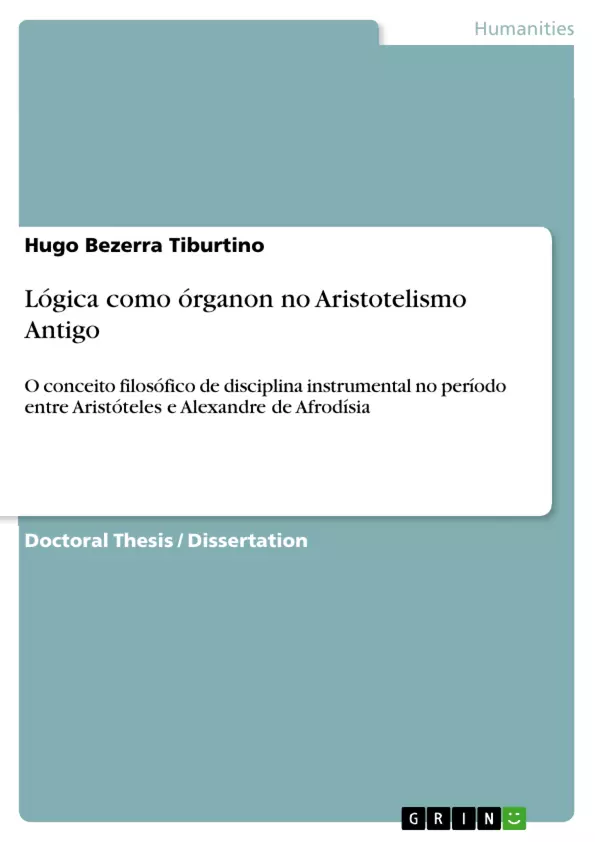Our major aim here was to research the philosophical relations of logic as tool according to the ancient Aristotelians untill Alexander of Aphrodisias. After our critical assessments of recent interpretations, it is even clearer that Aristotle had not any idea of logic as tool. Since Aristotle could not have argued for such doctrine, our research focused on one of the most significative contexts in which it appears, namely, in a debate with the Stoics; contrary to the ones who said logic is no part, but an instrument of philosophy, the Stoics themselves sustained that logic is part of philosophy and we assessed their arguments for this. It is true that these two theses are not throughout contradictory between them, in so far as, in the period between Aristotle and Alexander, there are signals of a compatibilist thesis, i.e. that the logic had been regarded as part and tool. May as it be, the Aristotelians criticized the arguments for logic as part, which we analyzed, as well as some positive arguments of the Aristotelian school; accordingly, the meaning of some discipline as an instrument (in Greek organon) was clear. That means: a discipline-organon implied relations with the concept of architectonicity; for, according to texts of Aristotle, objects and even technicians of some disciplines could be used as tools by other more architectonic disciplines; that is why later Peripateticians named the subordinate disciplines themselves tools; the concept of instrumental discipline implies that it helps to the finality of its superior. That in mind, we could see the specific case of logic which, as at least Alexader of Aphrodisias clearly regarded, helps to the contemplation, the utmost finality of man.
Inhaltsverzeichnis (Sumário)
- Introdução
- Aristóteles e o Órganon: A Lógica como Instrumento da Filosofia
- O Conceito de Órganon na Obra de Aristóteles
- O Papel da Lógica na Investigação Filosófica
- O Aristotelismo Antigo: A Tradição e a Recepção do Órganon
- A Recepção da Lógica Aristotélica na Antiguidade
- A Influência do Órganon no Pensamento Filosófico
- Alexandre de Afrodísia e a Defesa do Órganon
- A Interpretação de Alexandre de Afrodísia sobre o Órganon
- A Importância do Conceito de Disciplina Instrumental
- Conclusões: A Lógica como Disciplina Instrumental no Aristotelismo Antigo
Zielsetzung und Themenschwerpunkte (Objetivo e Temas Principais)
Este trabalho visa analisar a função da lógica como um instrumento da filosofia, no período entre Aristóteles e Alexandre de Afrodisia. O estudo se concentra no conceito de "órganon", utilizado por Aristóteles para designar as ferramentas lógicas como essenciais para a investigação filosófica. A pesquisa investiga como essa concepção se desenvolveu no contexto do aristotelismo antigo, explorando a influência do "órganon" no pensamento filosófico e a interpretação de Alexandre de Afrodísia sobre a lógica como uma disciplina instrumental.
- O conceito de "órganon" na obra de Aristóteles
- O papel da lógica na investigação filosófica no aristotelismo antigo
- A influência do "órganon" no pensamento filosófico
- A interpretação de Alexandre de Afrodísia sobre a lógica
- A importância do conceito de disciplina instrumental na filosofia
Zusammenfassung der Kapitel (Resumo dos Capítulos)
O primeiro capítulo apresenta a concepção de "órganon" na obra de Aristóteles, examinando a importância da lógica como ferramenta para a investigação filosófica. Aborda o papel da lógica na análise e organização do conhecimento, bem como sua relação com as outras disciplinas filosóficas.
O segundo capítulo analisa a recepção do "órganon" no aristotelismo antigo, explorando a influência da lógica aristotélica no pensamento filosófico. Discute a continuidade e as adaptações que a concepção de "órganon" sofreu nas diferentes escolas filosóficas da época.
O terceiro capítulo concentra-se na interpretação de Alexandre de Afrodísia sobre o "órganon", destacando a importância do conceito de disciplina instrumental. Examina como Alexandre de Afrodísia defendeu a lógica como um instrumento essencial para o desenvolvimento da filosofia, mas também explorou a autonomia e a importância da lógica em si.
Schlüsselwörter (Palavras-Chave)
Aristóteles, Órganon, Lógica, Filosofia, Alexandre de Afrodísia, Disciplina Instrumental, Aristotelismo Antigo, Investigação Filosófica, Epistemologia, História da Filosofia.
Preguntas frecuentes
¿Qué significa el concepto de "órganon" en la obra de Aristóteles?
El término "órganon" se refiere a la lógica como una herramienta o instrumento esencial para la investigación y el análisis filosófico.
¿Cómo consideraban los estoicos la lógica en comparación con los aristotélicos?
Mientras que los aristotélicos veían la lógica como un instrumento, los estoicos sostenían que la lógica era una parte integral de la filosofía misma.
¿Quién fue Alejandro de Afrodisia y cuál fue su papel?
Fue un influyente comentarista de Aristóteles que defendió la lógica como una disciplina instrumental necesaria para alcanzar la contemplación.
¿Por qué la lógica se considera una "disciplina instrumental"?
Porque ayuda a la finalidad superior de la filosofía, proporcionando las reglas del pensamiento correcto para organizar el conocimiento.
¿Cuál es la relación entre la lógica y la arquitectura del conocimiento?
La lógica funciona como una base técnica que permite a otras disciplinas más complejas operar con precisión y claridad.
- Arbeit zitieren
- Hugo Bezerra Tiburtino (Autor:in), 2014, Lógica como órganon no Aristotelismo Antigo, München, GRIN Verlag, https://www.grin.com/document/311776



